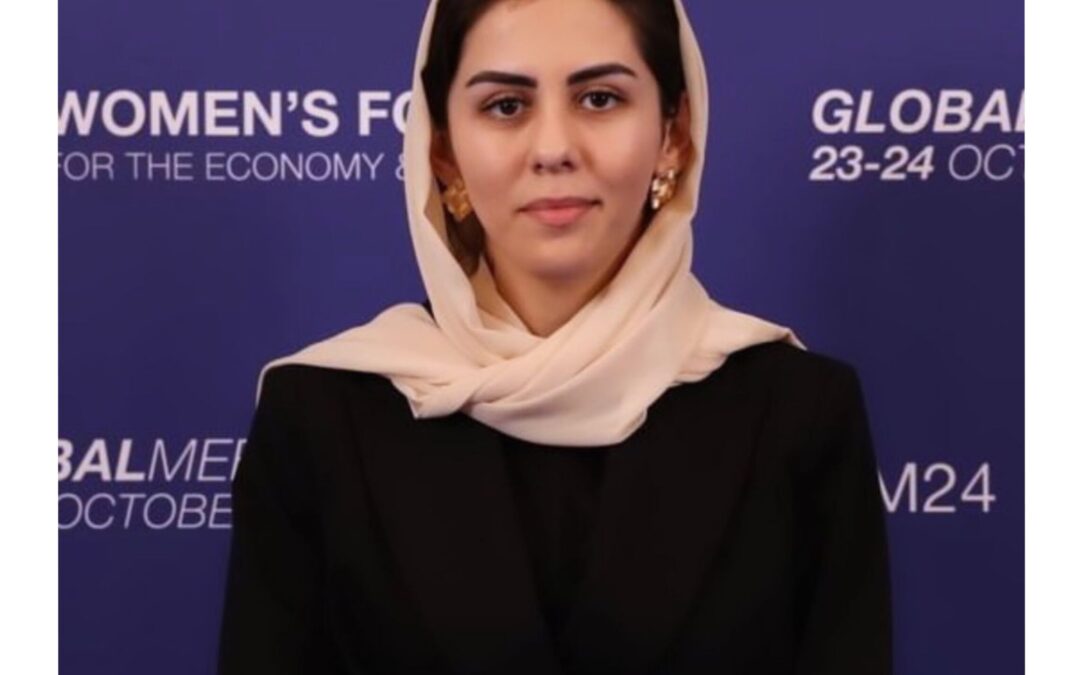To mark the International Day to Protect Education from Attack, Ms Shuhra Koofi, the Campaign Officer at Send My Friend to School, wrote a powerful piece on the ongoing struggle for Girls’ Education in Afghanistan. She highlights the barriers Afghan girls continue to face and explains why protecting their right to learn is more urgent than ever. Read on to learn more about this pressing call for global action.

Ms Koofi at the Women’s Forum Global Meeting in Paris
Education is not a privilege. It is a right. And it is a right that has been systematically stripped away from Afghan girls and young women by a regime determined to erase their futures. It has now been four years since the Taliban took back control of Afghanistan, and what happened immediately after was violent and quick. Women disappeared from the workforce, girls were denied the right to education, and millions of people’s voices were silenced, not by conflict, but by policy.
This situation continues today, on the eve of the fourth year anniversary of the Taliban takeover, the right to education is not being fulfilled. Access to quality education in Afghanistan is falling from public view. We must not forget the 2.2 million girls who are not in school, not learning, and unable to fulfil their potential.
Since August 2021, the Taliban has issued more than 80 edicts targeting women and girls, banning them from secondary and higher education, closing beauty salons, restricting movement without a male guardian, and removing women from public and political life. As an Afghan woman who grew up believing in the transformational power of education, and now working in the UK, to support education rights globally, the past four years have been both heartbreaking and deeply personal.
Before the takeover, Afghan women were making significant gains in political leadership. A 2004 constitution guaranteed gender equality, with 27% of all parliamentary seats to be held by women. By 2021, women held 69 of 249 seats and took part in peace negotiations. There was an independent Human Rights Commission, legal protections against violence, and a Ministry of Women’s Affairs. Today, all of this has been dismantled, and not a single woman remains a minister, judge, or provincial governor.
There have also been disturbing shifts in the education system itself. Since the Taliban’s return, the number of Taliban-run madrasas has exploded, from around 1,800 in 2021 to more than 21,000 in 2024, now outnumbering modern secular schools. These schools teach an extreme and misguided version of religion, limit learning about science, critical thinking, and women’s rights, and are where most of the Taliban themselves graduated. Experts warn this shift risks radicalising a new generation of boys, while girls are excluded entirely. Where once education offered a pathway to progress, it is now being weaponised.
The Taliban’s assault on education now directly threatens public health. In December 2024, women were banned from studying medicine, nursing, and midwifery, cutting off their access to the training needed to become healthcare professionals. In a country where cultural norms often prevent women from being treated by male doctors, this educational ban has far-reaching consequences. It doesn’t just prevent women’s career paths, it puts the health of millions in danger. Afghanistan already has one of the highest maternal mortality rates in the world, with one woman dying every two hours from pregnancy-related complications. Without a new generation of trained female doctors, nurses, and midwives, this crisis will only deepen.
It’s important to say this clearly: Denying girls education is a form of violence. It takes away opportunities and hope from them and limits their ability to shape their lives and futures. While the international community has expressed concern, these words have not been matched by sustained, strategic political leadership.
We need a renewed global response that puts Afghan girls and women at its centre. Political leaders, not only those in donor countries and multilateral bodies, but also from the Global South, Afghanistan’s neighbours, and Islamic nations including Gulf states that once supported the Taliban, must ensure that the rights of Afghan girls are not treated as negotiable. As Islam upholds the right to education for both men and women, these countries have a responsibility to prevent the Taliban from misusing religion to justify oppression. Education must be front and centre in any discussions with the Taliban, and progress must be both transparent and public.
Where education is protected, economies thrive, societies stabilise, and women’s voices are heard. In Afghanistan, the opposite is now true. Girls denied education face higher risks of child marriage, poverty, and exploitation. These are not hypothetical risks, they are real and unfolding every day.
And yet, despite everything, Afghan women have not given up. Underground networks of teachers continue to operate. Girls study at home in secret. Afghan women in exile raise their voices in international forums. Their defiance is powerful. It should not just be admired, it should be supported.
So, what can be done?
First, education must remain at the core of all international engagement with Afghanistan. No aid or recognition should come without clear progress on girls’ education.
Second, funding for Afghan civil society, particularly women-led organisations, must continue. These groups are lifelines, often operating under threat.
Third, the global community must speak with one voice. Too often, messages have been fragmented or quietly compromising. What is needed is unity and resolve from governments, institutions, and education advocates alike.
Four years is too long for any girl to be out of school. It is too long for silence, and too long for inaction. The world cannot move on while Afghan girls remain locked out of their futures.
The right to education is not a luxury, or a Western ideal. It is a basic human right. As long as Afghan girls are denied it, the global education movement must continue to raise its voice loudly and clearly.
The world must not look away.

